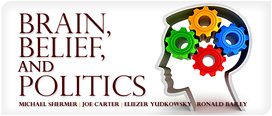This exchange was enlightening, and I have several comments. But first, since we all share many values in the libertarian philosophy, with a nod toward some conservative values (e.g., Joe Carter in this exchange), I thought you all might appreciate a smackdown of my book’s political chapter, from which the excerpt in this Cato Unbound exchange came. It appeared in the journal Science and was written by the NYU professor John Jost, whose work I criticized in The Believing Brain. Specifically, I was not disputing his data as much as I was his POV. While not overtly stated, it is there on every page of his big paper entitled: “Political Conservatism as Motivated Social Cognition,” in which he and his colleagues write:
Understanding the psychological underpinnings of conservatism has for centuries posed a challenge for historians, philosophers, and social scientists. We regard political conservatism as an ideological belief system that is significantly (but not completely) related to motivational concerns having to do with the psychological management of uncertainty and fear. Specifically, the avoidance of uncertainty (and the striving for certainty) may be particularly tied to one core dimension of conservative thought, resistance to change. Similarly, concerns with fear and threat may be linked to the second core dimension of conservatism, endorsement of inequality.
Although Jost, as you will see, eschews any bias against conservatives, the media picked up on it instantly: One commentator for Psychology Today asked, “Is Political Conservatism a Mild Form of Insanity?” The British paper The Guardian reported: “A study funded by the U.S. government has concluded that conservatism can be explained psychologically as a set of neuroses rooted in ‘fear and aggression, dogmatism and the intolerance of ambiguity.’” As if that was not enough to get the blood of conservatives boiling everywhere, the report’s authors linked Ronald Reagan and the rightwing talk show host Rush Limbaugh to Hitler and Mussolini, arguing they all suffered from the same affliction.
Jost’s response to my analyses was predictable:
The chapter “Politics of Belief” opens with an attack on a paper I coauthored, so Shermer will not be surprised to learn that I found it the worst in the book by far. He could have rolled up his sleeves and immersed himself in the now-abundant scientific literature documenting significant differences between adherents of leftist (or liberal) and rightist (or conservative) belief systems in terms of personality and cognitive and motivational styles as well as neurocognitive and other physiological structures and functions. Instead, he besmirches the entire enterprise of political psychology, perpetuating canards from the right-wing blogosphere and lazy, empirically unsubstantiated accusations of “liberal bias.” For example, Shermer writes: “Why are people conservative? Why do people vote Republican? The questions are typically posed without even a whiff of awareness of the inherent bias in asking it in this manner—that because Democrats are so indisputably right and Republicans so unquestionably wrong, conservatism must be a mental disease, a flaw in the brain, a personality disorder that leads to cognitive malfunctioning. Much as medical scientists study cancer in order to cure the disease, liberal political scientists study political attitudes and voting behavior in order to cure people of the cancer of conservatism.” In passages such as this, Shermer is not merely hyperbolic, inflammatory, and wrong about the specifics of the scientific articles he purports to critique. (One doubts he even read them.) By resorting to ideological deconstruction and essentially ad hominem forms of attack, Shermer violates his own intellectual standards—succumbing to the tendency, which he scorns in others, to reject out of hand scientific findings that might be experienced as disagreeable.
As I noted in my book, let’s begin by reversing the process and characterizing Democrats and liberals as suffering from a host of equally malevolent mental states: a lack of moral compass that leads to an inability to make clear ethical choices, an inordinate lack of certainty about social issues, a pathological fear of clarity that leads to indecisiveness, a naïve belief that all people are equally talented, and a blind adherence in the teeth of contradictory evidence to the notion that culture and environment alone determine one’s lot in society and therefore it is up to the government to remedy all social injustices. Once you set up the adjectives in the form of operationally defined personality traits and cognitive styles, it is easy to collect the data to support them. The flaw is in the characterization process itself.
I am curious to know if this estimable panel of Cato Unbound commentators sees the same bias that I do, or is it my own libertarian (and fiscally conservative) bias that bristles at being so characterized by such personality dimensions as “fear of uncertainty” “dogmatism” and “endorsement of inequality”?

